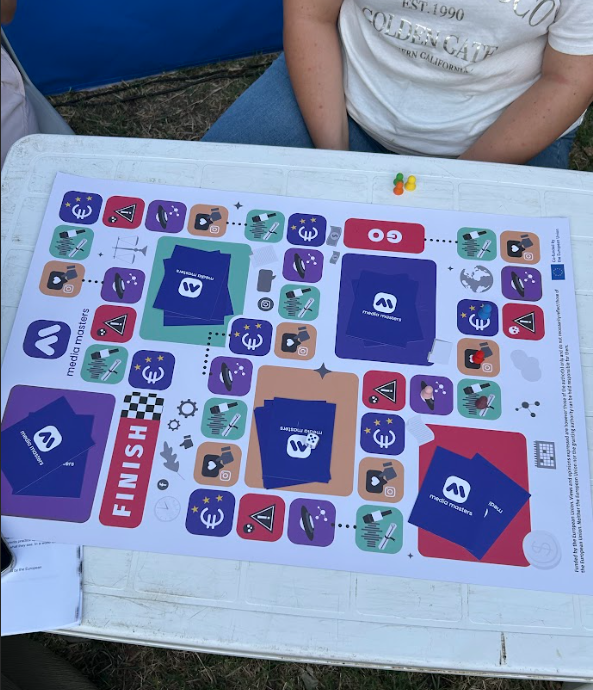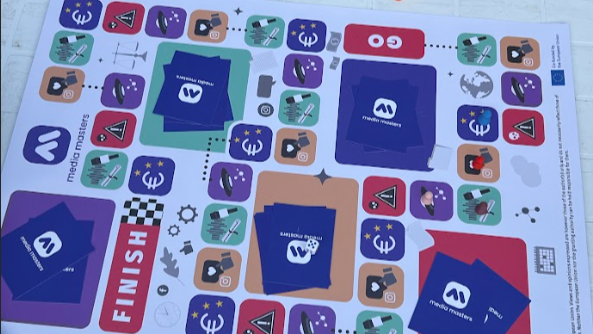As part of the MEDMAS project’s commitment to enhancing media literacy and fostering informed digital citizenship, two highly engaging and contextually relevant workshops were delivered in Greece, directly addressing the pervasive challenge of disinformation. These efforts reflect a growing recognition of the need to educate citizens, particularly young people, on how to critically engage with online content in an era marked by misinformation, fake news, and digital manipulation.
The first workshop, titled “How to Distinguish True News from Fake News,” was implemented in collaboration with Preventis Publishing House. It brought together young participants in a structured learning environment focused on building practical skills for evaluating the credibility of news sources, assessing information quality, and resisting the influence of manipulative or misleading content. The educational approach emphasized critical thinking through interactive and gamified methods.
At the heart of this experience was the MediaMasters educational game, a dynamic tool simulating real-world media scenarios. Through role-play and decision-making exercises, participants were tasked with analyzing various news stories to determine their authenticity. This hands-on method helped internalize theoretical concepts while making learning accessible, engaging, and enjoyable. Moreover, the workshop was held in a venue designed with inclusivity and accessibility in mind, reinforcing the importance of equal participation and community involvement in tackling digital challenges.
The second workshop took a more public, informal approach, taking place during the Pinios Festival in Larissa, a major cultural event that draws thousands of visitors each year. Here, the MEDMAS team, together with the Municipal Youth Council, transformed the festival space into a hub for media literacy engagement. The MediaMasters game was presented in an open-space format, allowing for spontaneous participation from a broad demographic, including youth, families, local NGOs, educators, and public officials.
This community-centered event proved that disinformation awareness and media education need not be confined to classrooms. By bringing educational tools directly into public spaces, the MEDMAS project bridged generational gaps and sparked meaningful conversations about truth, bias, and the role of responsible digital behavior. The involvement of the Municipal Youth Council was again crucial, acting as a connector between institutions and grassroots audiences and ensuring that young people remained central to the process.

The Broader Challenge of Disinformation in Greece
These workshops come at a time when disinformation is a significant and growing concern in Greece. The country, like many others in Europe, has faced a surge of false or misleading information online, often surrounding highly sensitive issues such as immigration, public health, elections, and international affairs. Social media platforms, in particular, have become major channels for the rapid spread of conspiracy theories, polarizing narratives, and fabricated news stories.
According to the Reuters Institute Digital News Report 2024, Greece ranks among the European countries where citizens express the highest levels of concern about fake news (Newman et al., 2024). The report indicates that more than two-thirds of Greek respondents worry about their ability to distinguish between real and fake content online. Compounding this problem is a general lack of trust in news media, driven by perceptions of political bias, sensationalism, and insufficient transparency.
Media literacy is not yet widely incorporated into Greek school curricula, and there is limited access to ongoing digital literacy training for adults. Additionally, fact-checking networks remain under-resourced, and misinformation can circulate for extended periods before being publicly addressed. As a result, both younger and older populations remain vulnerable to disinformation, especially when emotionally charged narratives align with pre-existing fears or beliefs.
The success of the MEDMAS workshops in Greece illustrates the potential of interactive, community-based learning approaches to counteract misinformation. However, to make a lasting impact, these efforts must be scaled up and sustained. Policymakers, educators, and civil society actors need to collaborate on developing a national media literacy framework, one that integrates formal education, lifelong learning, and public awareness campaigns.
Investing in digital skills development, fact-checking infrastructure, and independent journalism is essential to fostering a more informed, critically minded, and resilient society. Equally important is ensuring that interventions remain inclusive and culturally sensitive, especially in reaching marginalized groups that may be disproportionately affected by online misinformation.
In conclusion, while disinformation poses a complex and persistent challenge in Greece, initiatives like those under the MEDMAS project offer a hopeful and actionable path forward. By equipping citizens with the tools and confidence to question, verify, and understand the digital content they encounter, we are not only protecting truth, we are strengthening the democratic fabric of society.
